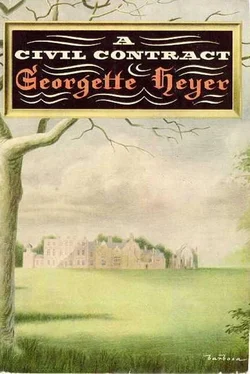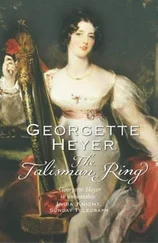Джорджетт Хейер - A Civil Contract
Здесь есть возможность читать онлайн «Джорджетт Хейер - A Civil Contract» весь текст электронной книги совершенно бесплатно (целиком полную версию без сокращений). В некоторых случаях можно слушать аудио, скачать через торрент в формате fb2 и присутствует краткое содержание. Год выпуска: 1961, Жанр: Исторические любовные романы, на английском языке. Описание произведения, (предисловие) а так же отзывы посетителей доступны на портале библиотеки ЛибКат.
- Название:A Civil Contract
- Автор:
- Жанр:
- Год:1961
- ISBN:нет данных
- Рейтинг книги:5 / 5. Голосов: 1
-
Избранное:Добавить в избранное
- Отзывы:
-
Ваша оценка:
- 100
- 1
- 2
- 3
- 4
- 5
A Civil Contract: краткое содержание, описание и аннотация
Предлагаем к чтению аннотацию, описание, краткое содержание или предисловие (зависит от того, что написал сам автор книги «A Civil Contract»). Если вы не нашли необходимую информацию о книге — напишите в комментариях, мы постараемся отыскать её.
But Adam didn't reckon with the Jenny nobody knew, or the unknown quality that lay hidden behind her demure and plain facade....
A Civil Contract — читать онлайн бесплатно полную книгу (весь текст) целиком
Ниже представлен текст книги, разбитый по страницам. Система сохранения места последней прочитанной страницы, позволяет с удобством читать онлайн бесплатно книгу «A Civil Contract», без необходимости каждый раз заново искать на чём Вы остановились. Поставьте закладку, и сможете в любой момент перейти на страницу, на которой закончили чтение.
Интервал:
Закладка:
Georgette Heyer
A Civil Contract
Chapter I
The library at Fontley Priory, like most of the principal apartments in the sprawling building, looked to the southeast, commanding a prospect of informal gardens and a plantation of poplars, which acted as a wind-break and screened from view the monotony of the fen beyond. On an afternoon in March the sunlight did not penetrate the Gothic windows, and the room seemed dim, the carpet, the hangings, and the tooled leather backs of the books in the carved shelves as faded as the uniform of the man who sat motionless at the desk, his hands lying clasped on a sheaf of papers, his gaze fixed on a clump of daffodils, nodding in the wind that soughed round the angles of the house, and passed like a shadow over the unscythed lawn.
The uniform showed the buff facings and silver lace of the 52nd Regiment; it was as threadbare as the carpet, but for all its shabbiness it seemed incongruous: as out of place in this quiet room as the man who wore it felt himself to be.
He should not have done so: the Priory was his birthplace, and he owned it; but his adult years had been spent in very different scenes from the placid fens and wolds of Lincolnshire, and his transition from the grandeur of the Pyrenees had been too sudden, and attended by circumstances of too much horror to make it seem to him anything other than a bad dream from which he would presently be awakened by a call to arms, or by a stampeding mule brought down by the guy-ropes of his tent, or by the mere bustle of a camp at first light.
The letters from England had reached him on the last day of January. He had first read his mother’s, written in the agitation of her bereavement, and conveying to him in a barely legible series of crossed and recrossed lines the news that his father was dead. He had been more shocked than grieved, never having enjoyed more than a casual acquaintance with the late Viscount. Lord Lynton, while bluff and good-natured when confronted with any of his offspring, had not been blessed with domestic virtues. A close friend of the Prince Regent, he had so much preferred the Prince’s society to that of his family that very little of his time had been spent in his home, and none at all in considering what might be the hopes or characteristics of one surviving son and two daughters.
He had been killed on the hunting-field, in the first burst, taking a double at the fly: not a surprising end for an intrepid and frequently reckless horseman. What did surprise his son was to discover that contrary to advice and entreaty he had been riding a green and headstrong young horse, never before tried in the field. Lord Lynton was a bruising rider, but not a fool; his heir, knowing the wild hurly-burly of a first burst with the Quorn or the Belvoir, concluded that he had ridden his young ‘un for a wager, and passed on to a maternal command to sell out instantly, and return to England, where his presence was most urgently needed.
The new Lord Lynton (but it was to be many weeks before he answered readily to any other title than Captain Deveril) could not find in his mother’s letter any reason why he should pursue a course so repugnant to himself. The letter from Lord Lynton’s man of business was less impassioned but more explicit. He read it twice before his brain was able to grasp its horrifying intelligence, and many times before he laid it before his Colonel.
No one could have been kinder; to no one else, indeed, could Adam Deveril have borne to have disclosed that letter. Colonel Colborne had read it, his countenance unmoved, and he had offered no unwanted sympathy. “You must go,” he had said. “I’ll grant you furlough immediately, to expedite the business, but you’ll sell out, of course.” Then, guessing the thoughts hidden behind Adam’s rigid countenance, he had added: “A year ago there might have been doubts which way your duty should have led you, but there are none now. We shall soon have Soult on the run in good earnest. I shan’t say you won’t be missed: you will be-damnably! — but your absence won’t affect the issue here. There’s no question about it, you know: you must go home to England.”
He had known it, of course, and had argued neither with his Colonel nor his own conscience. He had sailed on the first available transport, and, after a brief halt in London, had posted on to Lincolnshire, leaving his man of business to discover the extent of his liabilities, and his tailor to deliver with all possible expedition raiment suited to a civilian gentleman in deep mourning.
This had not yet arrived, but the news that his Regiment had distinguished itself at the Battle of Orthes had reached Fontley, making him at once exultant and wretched; and Mr Wimmering had presented himself at Fontley on the previous day. He had spent the night at the Priory; but the younger Miss Deveril was of the opinion that he could not have enjoyed more than two or three hours of sleep, since he had remained closeted with her brother until dawn. He was very civil to the ladies, so it was unkind of her to liken him to a bird of ill-omen. He was very civil to the new Viscount too, and very patient, answering all his questions without betraying that he found him lamentably ignorant.
Adam said, with a smile in his tired gray eyes: “You must think me a fool to ask you so many stupid questions. I’m a Johnny Raw, you see. I’ve never dealt with such matters as these. I don’t understand them, and I must.”
No, Mr Wimmering did not think his lordship a fool, but deeply did he regret that the late Viscount had not seen fit to admit him to his confidence. But the late Viscount had not seen fit to admit even his man of business wholly into his confidence: there had been transactions on the Stock Exchange in which agents unknown to Wimmering had been employed. He said mournfully: “I could not have advised his lordship to invest his money as he sometimes did. But his nature was sanguine — and I must acknowledge that on several occasions he was fortunate in ventures which I, as a man of affairs, could not have recommended to him.” He refreshed himself with a pinch of snuff taken from the battered silver box which he had been tapping with the tip of one desiccated finger, and added: “I was well-acquainted with your honoured parent, my lord, and have for long been persuaded that it was his hope to have restored to its former prosperity the inheritance to which he succeeded, and which, he knew, must in the course of nature presently fall into your hands. The speculative, and, alas, unlucky enterprise upon which he entered shortly before his untimely demise — ” He broke off, transferring his gaze from Adam’s face to the line of swaying tree-tops beyond the gardens. To them he apparently addressed the rest of his speech, saying: “It should never be forgotten that his late lordship’s nature was, as I have remarked, sanguine. Dear me, yes! If I had a hundred pounds for every occasion on which his lordship suffered reverses on ‘Change without the least diminution of his optimism I should be a wealthy man, I assure you, sir!”
No answer was vouchsafed to this. Adam, instead of seeking further reassurance, said in an even tone: “In plain words, Wimmering, how do my affairs stand?”
Plain words, in situations of the utmost delicacy, were obnoxious to. Wimmering, but, impelled by some quality in that quiet voice, he replied with unaccustomed bluntness: “Badly, my lord.”
Adam nodded. “How badly?”
Mr Wimmering set his fingertips exactly together, and replied evasively: “It is in the highest degree unfortunate that your lordship’s grandfather should have deceased before the coming of age of his late lordship. It was his intention to have resettled the estates. At that time, as I need not remind your lordship, my own revered parent stood in the same relation to the Fourth Viscount as I have stood in to the Fifth, and — if I may be permitted to express the wish — as I hope to stand in to your lordship. When, you my lord, attained your majority, it was my earnest desire to have induced his late lordship to repair an omission rendered inevitable by the inscrutable workings of Providence. His lordship, however, did not consider the moment opportune for the prosecution of a design which, I assure you, he had very much at heart Your presence, my lord, must have been essential: I can have no need to recall to your mind the circumstances which would have made it hard indeed for you to have applied for furlough just then. The Combat of the Coa! It seems but yesterday that we were eagerly perusing the account of that engagement, with the words of commendation bestowed by Lord Wellington on the officers and the men of your lordship’s Regiment!”
Читать дальшеИнтервал:
Закладка:
Похожие книги на «A Civil Contract»
Представляем Вашему вниманию похожие книги на «A Civil Contract» списком для выбора. Мы отобрали схожую по названию и смыслу литературу в надежде предоставить читателям больше вариантов отыскать новые, интересные, ещё непрочитанные произведения.
Обсуждение, отзывы о книге «A Civil Contract» и просто собственные мнения читателей. Оставьте ваши комментарии, напишите, что Вы думаете о произведении, его смысле или главных героях. Укажите что конкретно понравилось, а что нет, и почему Вы так считаете.








